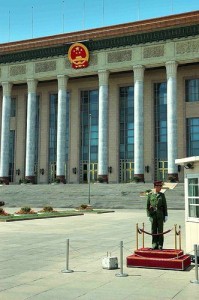Chinese Power Change Posted by sasha on Nov 2, 2012 in Culture
With the next American presidential election just a few days away and so much media hype surrounding it, there isn’t a whole lot of talk out there about the upcoming power change in China. Of course, this highlights two major differences between the world superpowers – while the US election is highly promoted, with candidates out in the public view seemingly 24/7, the transfer of power in China is much more low-key and for the most part takes place behind closed doors. To help you better understand exactly what’s going on in Beijing this month, I’ll try to break it down for you in a simple and concise way. Here goes nothing…
Next week (November 8th to be exact), the 18th National Congress of the Communist Part of China (中共十八大 – zhōng gòng shí bā dà) will kick off. China’s leaders will gather at the Great Hall of the People (人民大会堂 – rén mín dà huì táng) right here in central Beijing. The reason this year’s Congress is so important is due to the fact that seven of the nine members of the Politburo Standing Committee (PSC) will be retiring as a result of term limits and/or age restrictions. Included in the seven are current President of China, Hu Jintao (胡锦涛 – Hú Jǐn Tāo), and current Premier, Wen Jiabao (温家宝 – Wēn Jiā Bǎo). During the last Congress, the PSC grew from seven members to nine, but it is believed that this upcoming Congress will bring the number back down to seven. Not only will the top leaders turnover this year, but a majority of both the Central Military Commission and State Council will also be replaced. This will represent one of the greatest overall leadership changes in China in a long time.
In addition to the changing of the guard, the Congress has a few more things on its plate. They can also revise the constitution and evaluate the party’s work, which involves judging the work of the previous five years and looking forward to the next five. Basically, the party leadership is expected to follow the guidelines agreed upon during the Congress moving forward. With so much riding on their decisions next week, it’s clear why this is a big deal not only for China, but for the whole world.
The guest list for the 18th National Congress is quite high, with 2,270 delegates selected from 40 constituencies across the country (including Taiwan, Macau, and Hong Kong). Other delegations to the Congress include the People’s Liberation Army, Central State Owned Enterprises, and Central Banks and Financial Institutions. It truly is a “who’s who” of powerful people in China. However, as a rule, no more than 68% of the delegation may be leaders within the party; the other 32% are meant to be “grassroots” party members. The two guests people will be paying the most attention to will certainly be Li Keqiang (李克强 – Li Kè Qiáng), who is thought to be taking over for Grandpa Wen, and Xi Jinping (习近平 – Xí Jìn Píng), who it is widely speculated will replace Hu as President.
Learn more about China’s next President.
If you’re as into politics as I am, it’s certainly going to be an exciting week or so, with a big election in my home country and a big power change here in Beijing where I currently call home.
Barack Obama meeting with Xi Jinping earlier this year at the White House.

Build vocabulary, practice pronunciation, and more with Transparent Language Online. Available anytime, anywhere, on any device.
About the Author: sasha
Sasha is an English teacher, writer, photographer, and videographer from the great state of Michigan. Upon graduating from Michigan State University, he moved to China and spent 5+ years living, working, studying, and traveling there. He also studied Indonesian Language & Culture in Bali for a year. He and his wife run the travel blog Grateful Gypsies, and they're currently trying the digital nomad lifestyle across Latin America.





Comments:
Peter Simon:
Hi, again a nice post. I especially like the ‘here goes nothing …’ bit, which nicely circumvented stating the obvious, which is that the real difference is not that the US power change is highly promoted, but that there’s nothing to promote about the Chinese kind. There’re no elections to speak of in the European-American sense so the public interest itself is very low there. We might also dare to speculate that, with a lot less hype in China, people can stick to what concerns them most. The media left to be chewing on a bit less is not always a bad thing either.